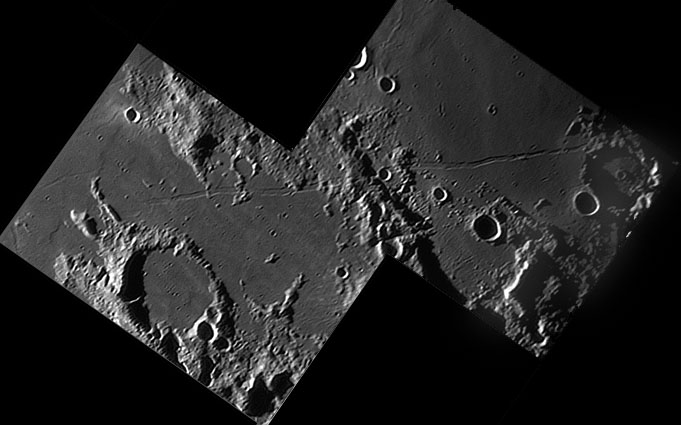Difference between revisions of "December 9, 2004"
| Line 3: | Line 3: | ||
<table width="85%" border="0" align="center" cellpadding="6" cellspacing="2"> | <table width="85%" border="0" align="center" cellpadding="6" cellspacing="2"> | ||
<tr> | <tr> | ||
| − | |||
</tr> | </tr> | ||
</table> | </table> | ||
| Line 25: | Line 24: | ||
<p align="left">Along the southern shore of Mare Nubium is a long rille that might initially be thought of as basin-concentric, like those rilles along the edges of southern Mare Serenitatis. But the Hesiodus Rille is not well behaved - instead of staying within the putative rim of the Nubium basin, it strikes across the basin's ill-defined rim (the ridge NW of Weiss) and heads into Palus Epidemiarum (see mouseover). Every lunar feature exists because of either chance (impact craters) or control by tectonics or topography. But this rille pays no heed to topography - cutting through the ridge in the center of the scene - and there is no obvious tectonic control. Unlike many of the linear rilles west of Procellarum, the Hesiodus Rille is not radial to the Procellarum/Gargantuan impact basin. So this fine image beautifully illustrates the rille, but doesn't help us (at least me) explain why it is there. | <p align="left">Along the southern shore of Mare Nubium is a long rille that might initially be thought of as basin-concentric, like those rilles along the edges of southern Mare Serenitatis. But the Hesiodus Rille is not well behaved - instead of staying within the putative rim of the Nubium basin, it strikes across the basin's ill-defined rim (the ridge NW of Weiss) and heads into Palus Epidemiarum (see mouseover). Every lunar feature exists because of either chance (impact craters) or control by tectonics or topography. But this rille pays no heed to topography - cutting through the ridge in the center of the scene - and there is no obvious tectonic control. Unlike many of the linear rilles west of Procellarum, the Hesiodus Rille is not radial to the Procellarum/Gargantuan impact basin. So this fine image beautifully illustrates the rille, but doesn't help us (at least me) explain why it is there. | ||
</p> | </p> | ||
| − | <blockquote><p align="right">— [mailto:tychocrater@yahoo.com Chuck Wood]</blockquote> | + | <blockquote> |
| − | <p align="left" | + | <p align="right">— [mailto:tychocrater@yahoo.com Chuck Wood]</blockquote> |
| + | <p align="left"><b>Technical Details:</b><br> | ||
Nov 6, 2004. Planewton DL-252 telescope + Lumenera LU075M camera + IR blocking filter; 1/30th sec exposure, 500 of 4450 frames stacked. </p> | Nov 6, 2004. Planewton DL-252 telescope + Lumenera LU075M camera + IR blocking filter; 1/30th sec exposure, 500 of 4450 frames stacked. </p> | ||
<p><b>Related Links:</b><br> | <p><b>Related Links:</b><br> | ||
Revision as of 18:00, 17 January 2015
A Long Valley
Image Credit: Paolo Lazzarotti
|
|
A Long Valley Along the southern shore of Mare Nubium is a long rille that might initially be thought of as basin-concentric, like those rilles along the edges of southern Mare Serenitatis. But the Hesiodus Rille is not well behaved - instead of staying within the putative rim of the Nubium basin, it strikes across the basin's ill-defined rim (the ridge NW of Weiss) and heads into Palus Epidemiarum (see mouseover). Every lunar feature exists because of either chance (impact craters) or control by tectonics or topography. But this rille pays no heed to topography - cutting through the ridge in the center of the scene - and there is no obvious tectonic control. Unlike many of the linear rilles west of Procellarum, the Hesiodus Rille is not radial to the Procellarum/Gargantuan impact basin. So this fine image beautifully illustrates the rille, but doesn't help us (at least me) explain why it is there. Technical Details: Related Links: Tomorrow's LPOD: Overlooked Secondaries |
|
Author & Editor: Technical Consultant: Contact Translator: A service of: |
COMMENTS?
Register, and click on the Discussion tab at the top of the page.




